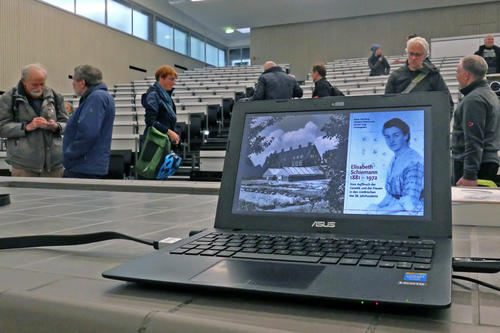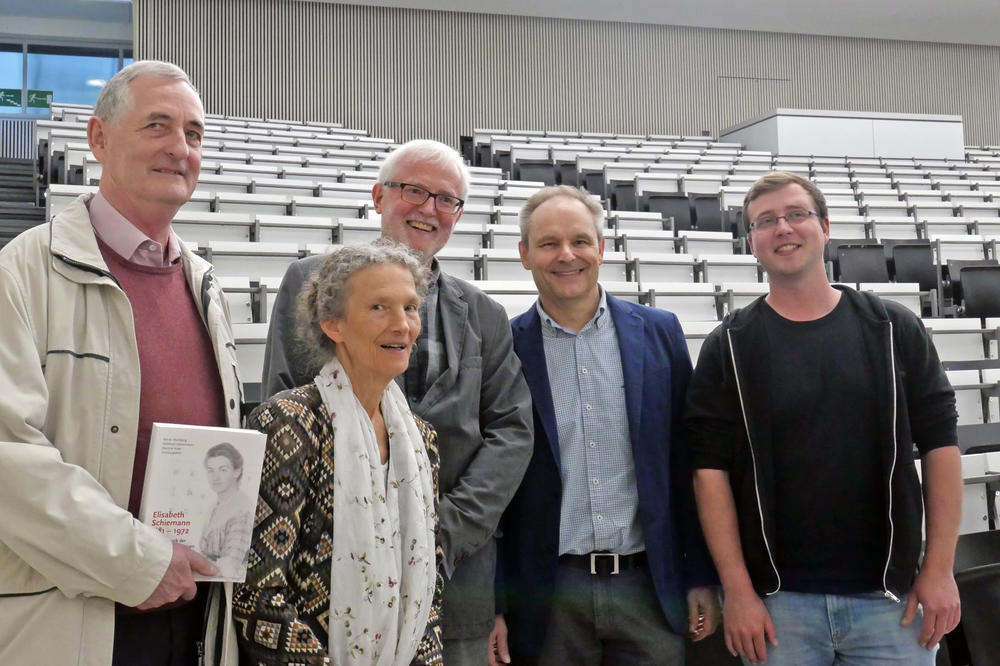A Groundbreaking Biologist with Unshakable Integrity
The large lecture hall in the plant physiology building at the Institute of Biology at Freie Universität is named for Berlin-based plant geneticist Elisabeth Schiemann.
May 08, 2019
Elisabeth Schiemann worked at the Institute of Heredity Research (based in Dahlem starting in 1922, currently Applied Genetics) and at the Botanic Garden and Botanical Museum from 1914 until 1943. Her permission to teach was revoked by the Nazi regim
Image Credit: Marion Kuka
In the future, when biology students enter the large lecture hall in the Plant Physiology Building at Königin-Luise-Straße 12-16, they will be reminded of a woman who was one of the first women in Germany to attend and graduate from a regular university: Elisabeth Schiemann. As part of the annual Haberlandt Lecture at the Institute of Biology, the lecture hall was officially renamed.
The lecture, which takes place at the beginning of each spring/summer semester, is named in honor of the Austrian botanist Gottlieb Haberlandt, who taught in Berlin from 1910 to 1923 and caused a sensation with his work on plant anatomy and physiology. This year, however, plant geneticist Elisabeth Schiemann took center stage. Biology historian Professor Ekkehard Höxtermann paid tribute to Schiemann's life and work with a lecture on the "groundbreaking biologist" with an "incorruptible character," who lived predominantly in Berlin from 1881 to 1972.
Friede-Renate Weigel (2nd from left), Schiemann’s great-niece; Daniel Wewer (far right), Thomas Schmülling (2ndfrom right), initiators of the lecture; Reiner Nürnberg (far left) and Ekkehard Höxtermann (3rd from left), co-editors of research volume
Image Credit: Marion Kuka
Schiemann was a biologist who taught and did research at the Institute of Heredity Research – today’s Applied Genetics at the Institute of Biology at Freie Universität – and later at the Botanic Garden and Botanical Museum (BGBM) in the early 20thcentury, fighting prejudice and resistance in a working world dominated by men, but that wasn’t her only achievement
Ekkehard Höxtermann, an expert on Schiemann’s life and work, gave other reasons to keep her memory alive: She was a member of the first generation of geneticists in Germany and was one of the leading scientists working on crop research. She studied key mechanisms of evolution and plant breeding. Her main work, Die Entstehung der Kulturpflanzen (The Development of Crops), was a pioneering treatise with a large and lasting impact. Schiemann is considered one of the founders of paleoethnobotany, which studies the connections between vegetation and settlement and the spread of plants by humans. A firm opponent of the Nazi regime, anti-Semitism, and racism, she took a stand through outspoken criticism and silent acts. She was given the title of “Righteous among the Nations” by the Yad Vashem Holocaust remembrance center for her stance. After World War II, Schiemann played an important role in rebuilding the German science and academic sectors and maintaining scholarly and scientific ties during the Cold War.
But even with all her achievements, Schiemann is not a household name – unlike her close friend Lise Meitner. Now, with her name on the lecture hall, Elisabeth Schiemann is sure to serve as inspiration to future generations of biologists
Further Information
Dr. Reiner Nürnberg, the son of a former close colleague of Schiemann, was the initiator behind the idea of documenting and recognizing Schiemann’s life and work in a collected research volume. The book, Elisabeth Schiemann 1881-1972. Vom Aufbruch der Genetik und der Frauen in den Umbrüchen des 20. Jahrhunderts (Elisabeth Schiemann 1881–1972. On the Start of Genetics and Women during the Radical Changes of the 20th Century, Rangsdorf 2014), contains articles from the fields of biology, history, resistance studies, and women’s studies, along with contemporary reports.


